Overview
The article focuses on the physical changes and care required during pregnancy, addressing how a woman's belly transforms throughout the trimesters and the essential practices for maintaining health and well-being. It supports this by detailing the significant physical developments during each trimester, the importance of proper nutrition, skincare, emotional support, and the management of discomfort, emphasizing that understanding these changes fosters a positive experience for expectant mothers.
Introduction
Pregnancy is a profound journey marked by a tapestry of physical, emotional, and nutritional transformations. As expectant mothers navigate this significant life stage, understanding the myriad changes that occur—particularly in their bodies—can foster a sense of empowerment and well-being. From the early signs of a growing belly to the essential care tips that promote comfort and health, each phase of pregnancy brings its own unique challenges and joys.
This article delves into the critical aspects of pregnancy, offering insights on:
- Managing discomfort
- Maintaining a balanced diet
- Prioritizing emotional health
By equipping HR Benefits Managers with knowledge and strategies to support their teams, a culture of wellness can be cultivated that values both the physical and mental health of mothers-to-be. Embracing this transformative time with awareness and compassion can pave the way for healthier pregnancies and happier families.
Understanding the Physical Changes in Your Belly During Pregnancy
Pregnancy brings about remarkable changes in an individual's body, particularly in a woman's belly. In the first trimester, hormonal fluctuations can lead to a subtly rounder appearance, even though the baby remains small. During this time, it's crucial for expectant individuals to get more rest than usual, as they may experience increased fatigue.
As the journey progresses into the second trimester, significant expansion occurs as the uterus grows, making the woman's belly more pronounced—a pivotal moment when many individuals begin to visibly show. This period often coincides with skin changes that may include the development of stretch marks, which, while common, can be effectively managed with proper skincare routines. Additionally, hormonal fluctuations can lead to conditions like hyperpigmentation and melasma, as noted in the case study titled "Integumentary Changes in Pregnancy," which highlights the importance of awareness in providing appropriate dermatological care during this time.
By the third trimester, the woman's belly reaches its peak size as the baby grows rapidly in preparation for birth. Acknowledging and valuing these physical changes is essential; as Lauren Barth wisely points out,
Body dysmorphia during this period: How to combat negative body image.
Understanding how body dysmorphia can impact an individual's experience during pregnancy underscores the importance of fostering a supportive environment for expectant mothers.
Awareness of these changes not only promotes a positive body image but also helps healthcare providers differentiate between normal changes and those that may require medical attention. By remaining knowledgeable and compassionate, HR Benefits Managers can play a crucial role in promoting female wellness during this transformative period.
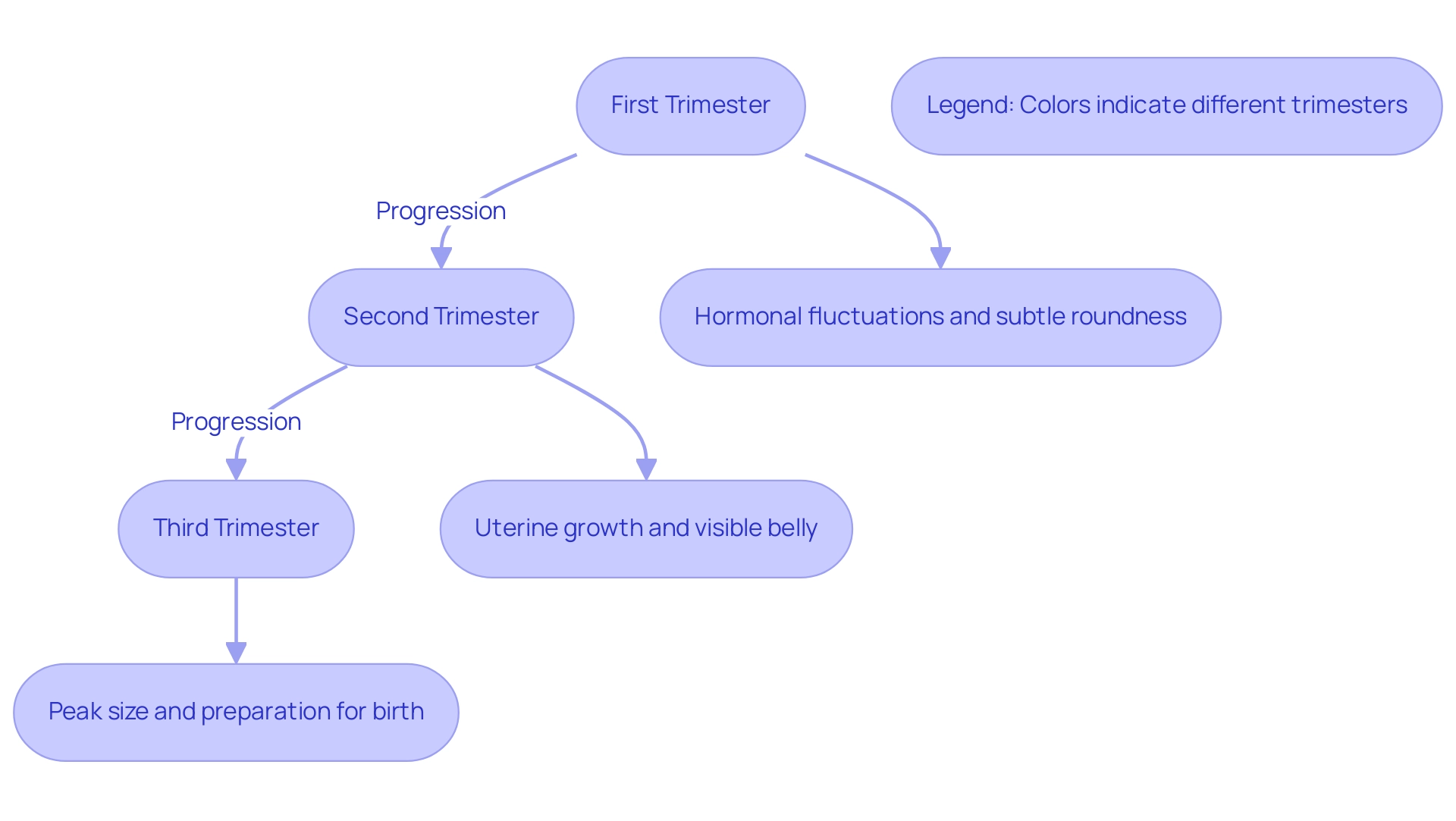
Essential Care Tips for Your Pregnant Belly
Nurturing your woman's belly is essential for both your comfort and the well-being of your baby. Regular moisturizing is crucial; using creams or oils enriched with cocoa butter or vitamin E can significantly help in keeping your skin hydrated and minimizing the appearance of stretch marks. As Dr. Nani Kumala Dewi states, 'The selection of safe topical products for pregnant women with good efficacy is important for fetomaternal health.'
This emphasizes the significance of selecting suitable products during gestation. Dermatologists promote regular moisturizing, highlighting that it is essential for preserving skin elasticity during this period. To complement this, staying active through gentle exercises, including walking and prenatal yoga, can boost blood circulation and alleviate discomfort.
A recent study highlights the benefits of prenatal yoga, showcasing success stories of women experiencing relief from pregnancy-related aches and improved overall well-being. Furthermore, a multicenter prospective study revealed no evidence of an increase in anomalies consistent with retinoic acid embryopathy, supporting the safety of moisturizing products during gestation. Additionally, a case study on the cosmetic use of skin-lightening products during gestation raises concerns about the safety and potential hazards of such products, reinforcing the need for careful product selection.
A balanced diet rich in fruits, vegetables, whole grains, and lean proteins is key to nourishing both you and your baby. Don't forget to stay hydrated—drinking plenty of water throughout the day is vital. Finally, always listen to your body; ensure you rest when needed and consult your healthcare provider if you notice any concerning changes in your woman's belly or experience unusual symptoms.
By prioritizing these practices, you can empower yourself and contribute positively to your pregnancy journey.
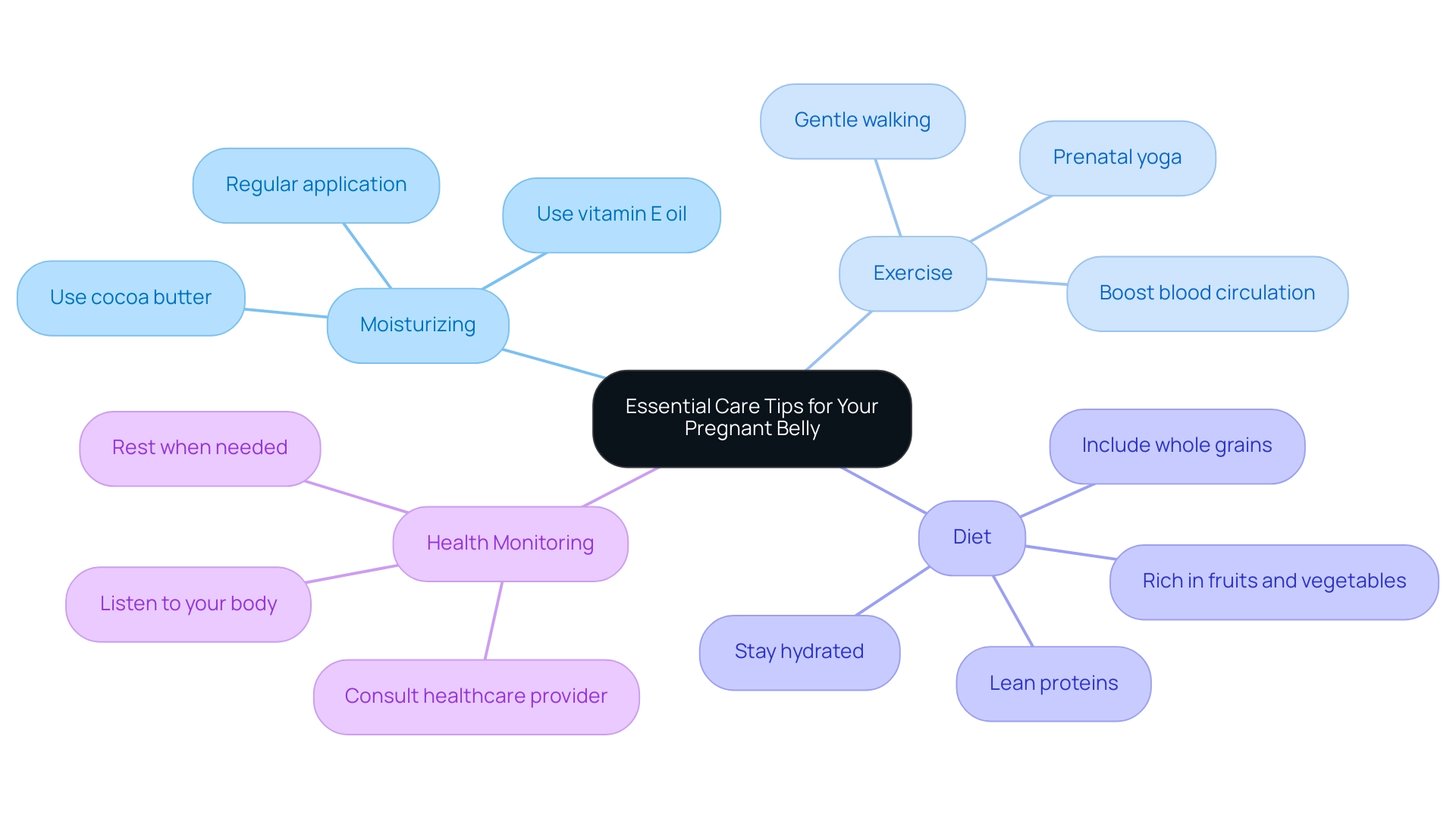
Managing Discomfort and Pain During Pregnancy
Pregnancy often brings a variety of discomforts, with back aches, round ligament sensations, and swelling affecting a woman's belly being among the most common. These issues can significantly impact a woman's belly and overall quality of life, making it essential to address them effectively. Research indicates that predictors of moderate to severe low back discomfort include:
- Pre-pregnancy low back discomfort
- Multiparity
- Lower education levels
Furthermore, it's important to recognize that during pregnancy, the average weight gain around a woman's belly is between 11 to 12 kg, which can lead to discomforts such as back strain. To alleviate back discomfort, utilizing a maternity support belt can provide much-needed assistance for a woman's belly, while maintaining good posture is crucial for minimizing unease. As Stahmann Dilfer C. advises,
'Squat down on your feet, feet pointing at a 45° angle to the sides, heels on the floor.
Open your [knees wide using thigh muscles](https://physio-pedia.com/Low_Back_Pain_and_Pregnancy) and push them apart until they are directly over your feet.'
This technique can help in managing physical discomfort. For discomfort in a woman's belly due to round ligament issues, gentle stretching exercises and warm baths can provide significant relief.
Swelling is another prevalent issue related to a woman's belly, often managed through:
- Elevating the feet
- Wearing compression socks
- Avoiding prolonged standing
Furthermore, regular prenatal massages are beneficial for relieving tension in a woman's belly and enhancing relaxation. The Mobility Index for Expectant Mothers, a validated tool, can also be referenced to assess mobility related to back and pelvic discomfort, ensuring that women receive the support they need for a healthier experience during this time.
Always consult with a healthcare provider if pain is severe or persistent.

Nutrition and Diet for a Healthy Pregnancy
A balanced diet during pregnancy is essential for both maternal health and the development of the woman's belly. Pregnant individuals should concentrate on including a range of nutrient-dense foods, especially those rich in folic acid, like leafy greens, beans, and fortified cereals. Folic acid is vital for preventing neural tube defects and supporting healthy fetal growth.
In fact, the Healthy Eating Index total score was 51.5 out of 100 during the third trimester, highlighting the need for improved dietary habits among expectant individuals. Iron is another critical nutrient; sources like lean meats, spinach, and legumes can help prevent anemia, ensuring that the woman's belly and the baby remain healthy. Omega-3 fatty acids, especially those found in fatty fish like salmon, are crucial for brain development—it's recommended to consume two to three servings of fish each week to reap these benefits.
Staying hydrated is equally important; drinking plenty of water while limiting caffeine and sugar intake can significantly impact overall well-being. Additionally, proactive meal planning can ensure that pregnant individuals obtain the necessary nutrients to support their health and the health of their developing fetus. As emphasized by recent findings, effective nutrition management is a crucial element in promoting a healthy pregnancy, enabling individuals to take charge of their well-being during this critical time.
As noted by Usha Ramakrishnan, PhD, 'The authors report no conflict of interest,' reinforcing the credibility of the research on folic acid supplementation conducted by Bulloch et al. Furthermore, for overweight pregnant women, collaborating with their ob-gyn to create a tailored nutrition and exercise plan is crucial, as monitoring weight gain can significantly impact the woman's belly and fetal development.
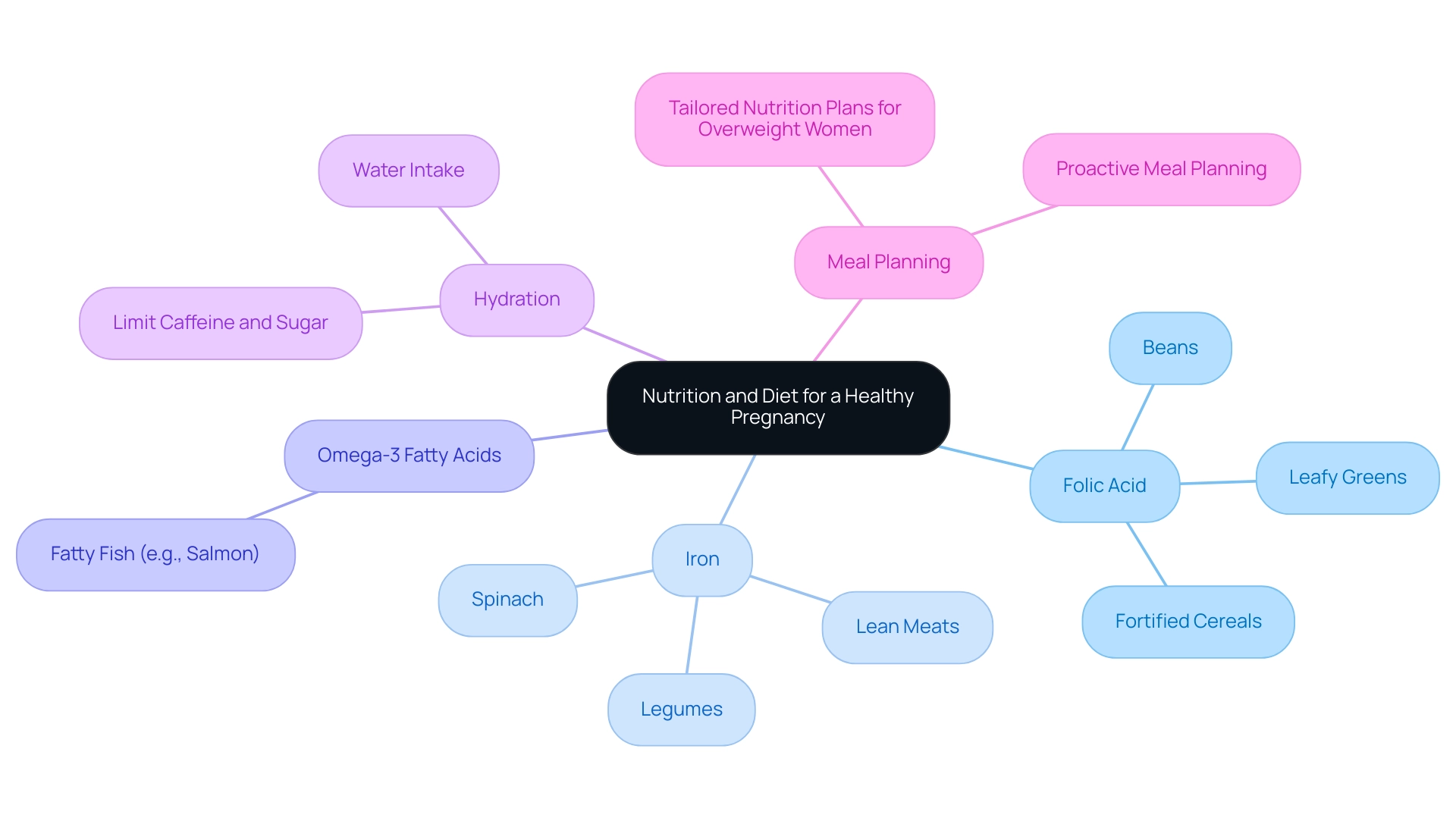
Emotional Well-being and Support During Pregnancy
Pregnancy is a transformative journey filled with a spectrum of emotions, ranging from joy to anxiety. It’s crucial for expecting mothers to acknowledge these feelings and seek support as needed. Engaging openly with partners, family, or friends about their experiences can create a supportive environment.
Joining a prenatal support group can be particularly beneficial, as it provides an opportunity to connect with other mothers facing similar challenges. Recent studies indicate that 75% of individuals dealing with perinatal mental challenges do not receive the treatment they need, underscoring the importance of community support during this time.
Mindfulness practices such as meditation and deep-breathing exercises are effective tools for managing stress and anxiety, helping mothers cultivate emotional resilience. If feelings of anxiety or depression escalate, contacting a mental wellness expert is a vital step. As K Srinivasan from St. John's Research Institute points out, the impact of maternal mental well-being is also known to have lasting implications on child/adolescent behavior.
This underscores the significance of prioritizing emotional well-being not just for mothers, but for the future welfare of their children as well. Very young infants are sensitive to their environment, and prolonged maternal mental issues can negatively affect mother-infant attachment, breastfeeding, and infant care, emphasizing the broader implications of maternal mental well-being on child development.
The Veterans Administration Reproductive Mental Wellness Consultation Program serves as a real-world example of effective support systems for maternal mental well-being, demonstrating how community initiatives can improve access to care. Furthermore, referencing the hypothesis by Kammerer et al. on the HPA axis and perinatal depression provides a scientific basis for understanding the emotional well-being challenges faced during pregnancy.
By fostering an environment that promotes mental wellness, HR Benefits Managers can play a pivotal role in supporting their teams, ensuring that emotional health is valued just as highly as physical health during this critical life stage.
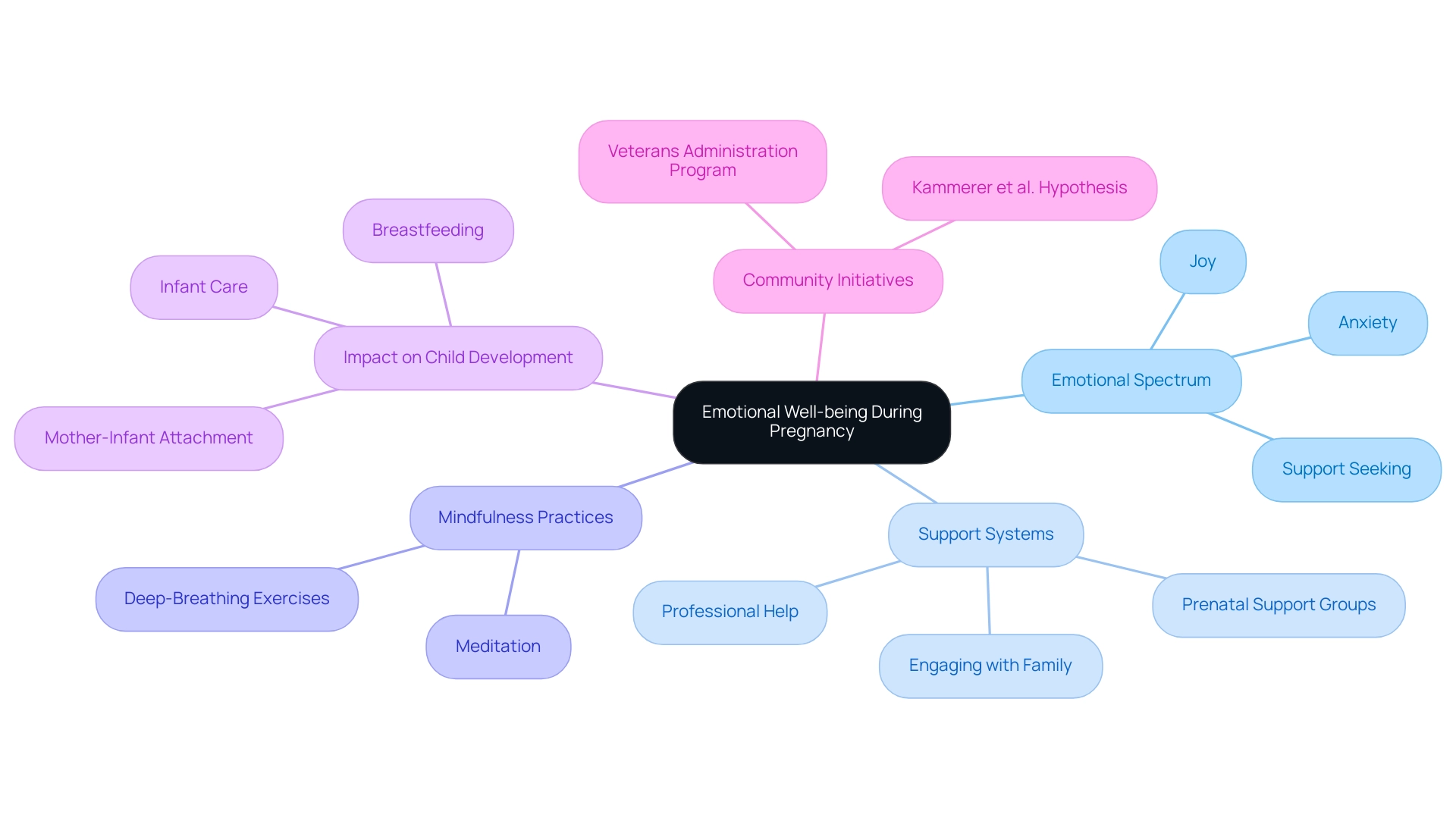
Preparing for Postpartum Care
Navigating postpartum recovery can indeed be a formidable journey, yet proactive preparation can significantly ease the transition into motherhood. Start by discussing your postpartum plan with your healthcare provider to ensure a clear understanding of your needs and expectations. Stock your home with essential supplies—comfortable clothing, sanitary pads, and pain relief options are vital for your comfort.
Additionally, don’t underestimate the power of a strong support network; a qualitative study of first-time mothers' experiences highlights that social support is crucial during this period, as it can alleviate stress and enhance recovery. Whether it’s family helping with household chores or friends providing emotional encouragement, their assistance can be invaluable. Prioritize self-care during this time; remember that rest is essential, and it’s perfectly acceptable to ask for help.
As Langer aptly notes,
The resources are here; it’s just that they are not accessible to the people who need them.
Understanding that taking time for yourself to heal is not only acceptable but necessary can set a positive tone for your postpartum experience. The Who's Global Guidelines for Postnatal Care, which include 63 recommendations—31 of which are new or updated—highlight the importance of at least three additional checkups within the first six weeks.
These guidelines emphasize that quality care—both physical and mental—is crucial for new mothers. Embrace this time for recovery and prepare to thrive on this beautiful journey into motherhood.
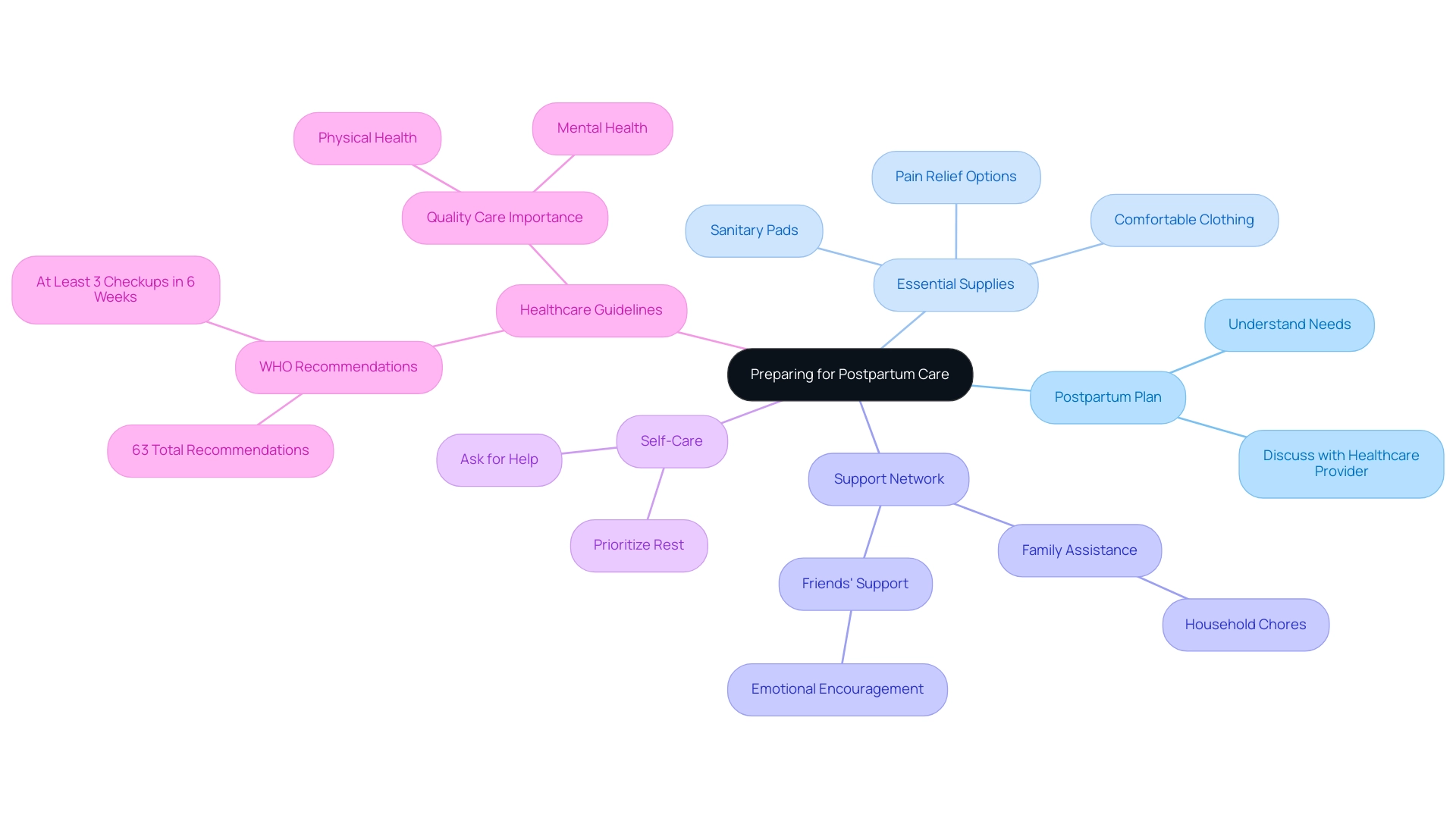
Conclusion
The journey through pregnancy is a profound and transformative experience, marked by significant physical, emotional, and nutritional changes. Understanding the physical transformations in the body, particularly the belly, allows expectant mothers to embrace their evolving selves with confidence. From managing discomfort through supportive practices to prioritizing a nutritious diet that nourishes both mother and baby, each aspect plays a vital role in fostering a healthy pregnancy.
Emotional well-being is equally critical during this time. Recognizing the spectrum of feelings that accompany pregnancy and seeking support can create a nurturing environment for both mothers and their families. By promoting mindfulness and encouraging open communication, HR Benefits Managers can help cultivate an atmosphere where emotional health is prioritized alongside physical health.
As the article emphasizes, the impact of a supportive network cannot be overstated. Preparing for postpartum care and ensuring access to essential resources further enhances the overall experience of motherhood. By taking proactive steps to support expectant mothers, organizations can foster a culture of wellness that not only benefits the individuals but also strengthens families and communities.
In conclusion, embracing the complexities of pregnancy with awareness, compassion, and practical support paves the way for healthier experiences. By prioritizing both physical and emotional health, HR Benefits Managers can make a significant difference in the lives of their team members, ultimately contributing to happier families and a thriving workplace.
Frequently Asked Questions
What physical changes occur in a woman's body during pregnancy?
Pregnancy brings about significant changes, particularly in the belly. In the first trimester, hormonal fluctuations can create a subtly rounder appearance. By the second trimester, the uterus grows, making the belly more pronounced, and skin changes such as stretch marks may occur. In the third trimester, the belly reaches its peak size as the baby grows rapidly.
How can expectant individuals manage fatigue during the first trimester?
It is crucial for expectant individuals to get more rest than usual during the first trimester due to increased fatigue.
What skincare considerations should pregnant individuals keep in mind?
Regular moisturizing with creams or oils enriched with cocoa butter or vitamin E is essential for keeping the skin hydrated and minimizing stretch marks. Dermatologists recommend selecting safe topical products for fetomaternal health.
What are the common skin changes that occur during pregnancy?
Common skin changes include the development of stretch marks, hyperpigmentation, and melasma. Awareness of these changes is important for providing appropriate dermatological care.
How can prenatal yoga benefit pregnant individuals?
Prenatal yoga can boost blood circulation, alleviate discomfort, and improve overall well-being during pregnancy, according to recent studies.
What dietary recommendations are important for pregnant individuals?
A balanced diet rich in fruits, vegetables, whole grains, and lean proteins is key to nourishing both the individual and the baby. Staying hydrated by drinking plenty of water is also vital.
What should pregnant individuals do if they notice concerning changes in their bodies?
It is important to listen to your body and consult your healthcare provider if you notice any concerning changes or experience unusual symptoms.
How can HR Benefits Managers support female wellness during pregnancy?
By remaining knowledgeable and compassionate about the physical changes during pregnancy, HR Benefits Managers can help differentiate between normal changes and those that may require medical attention, fostering a supportive environment for expectant mothers.

